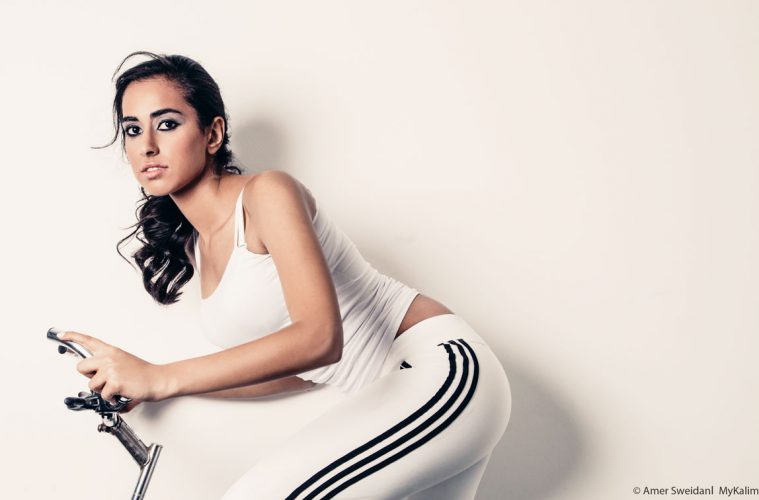بالعربي
Photographed by Amer Sweidan
Makeup by Reem Jarhum
Hair by Nart Beauty Salon
Styled/designed by Fadi Zumot
Modeled by Razan
Directed by Khalid Abdel-Hadi
Via social media and emails, My.Kali documents the memories, stories and reflections of the LGBT+, the queer and feminist community in the Middle East and North Africa of Egyptian singer/actress, Ruby.
.
.
Omar – Jordan
“I remember, it was that very day where I was over at my sister’s and playing with my baby nephews, I was 16 at the time and I remember I had a complete ability to sit and watch music videos for hours and hours. So that’s what I naturally did at my sister’s, I tuneed into either Mazzika or Melody, watch for a bit then look away and there it was, the rich and bright beat in the intro. I don’t know why, but I called in my sister. It was so fascinating seeing this Arabic, beautiful, young and tan girl in a belly dancing suit walking amongst gaping white people with a shallow depth of field.
I remember thoroughly enjoying the song and trying to explain my closeted fascination with her, saying shit like ‘Oooh, she’s so hot!’ to my sister when in reality I meant, ‘I want to be that bitch’. From then onwards, I kept a close eye.
Ruby became the cause and effect of opposition campaigns, that red-hot name matched the tabloids and bad press that wanted to refer to the ‘deterioration of a generation’ – but I believe she became rather the scapegoat of every Arab artist and even average Joe that that was trying to win the moral and conservative Olympics. Some arguments were that ‘She shouldn’t have done this because she’s being seductive and that is haram’, others argued that ‘She shouldn’t have done this because she’s objectifying women,’ and so on and so forth. But nobody should tell any woman what she should and shouldn’t do.
Ahein.”
Amira – Egypt
“Ruby is the only singer whose picture I hung on my bedroom wall. Of course, during my teenage years, my room was filled with posters of different actresses and artists. That was how I first started discovering my orientation. At one point I was determined to change my name to Ruby, and I almost did, but ‘The Powers That Be’ stopped me from doing so!”
Qais – Jordan
“The first time I saw Ruby was when I was almost 14 years old and her first video, ‘Enta Aref Leh’, was released. Whenever that video came on TV, I would eagerly wait for the last scene where she’s wearing her belly dancing costume. I was like, ‘She’s so amazing and confident, walking down the street like this’. I was eager to do the same thing in Wakalat Street in Amman to see how people would react or what they would say. I used to enjoy drawing attention.
I also remember trying to convince my parents to get me an elliptical machine, an exercycle. After a while they agreed to buy it, but unfortunately I told my sister that I wanted it so my butt could become like Ruby’s in her video ‘Leh Bedary Keda’, and she went and told my dad, so they refused to get it for me.”
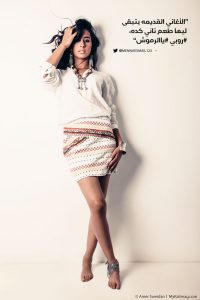
Linon white top, Massimo Dutti. Embroidery skirt, bracelet used as anklet, earrings and cuff, all BCBG Max Azria. Necklace, vintage. Look inspiration: Ruby’s ‘Yal-Romoush‘
Jack – Syria
“She was amazing, distinctive in her style, vitality, freedom, boldness, and the beauty of her well-composed music. It was every girl’s dream to become her, and many men liked her a lot for various reasons. Ruby was one of the first Egyptian female artists to enter the video clip world with a bold statement soon after the Lebanese artists had started the trend. She broke the norm as a tan Egyptian university student, going out to the street in unusual outfits to dance, like in her first video, ‘Enta Aref Leh’, and her second bold video on the elliptical machine, ‘Leh Bedary Kedah’.”
Ibrahim – Yemen
“Ruby was considered an immoral singer in our household. I used to listen to her when no one was home. If my family had discovered that I was listening to or watching her, I would’ve gotten hell for it! Ruby is love, she could be crowned as the Arab gay icon.”
Tayeb – Algeria
“The best music and videos are the ones that remind me of a certain time, especially the song ‘Leh Bedary Kedah’. The weird thing is, I read comments by some gay people criticizing her for shaking her butt. I was like, seriously?!”
Najma – Tunis
“I still remember when oriental culture suddenly hit Tunisia in the early 2000s. Usually, we were used to following Western culture as most of us were French educated. As a teenager, I couldn’t care less about this new social phenomenon, but there was something about that singer (Ruby) that impressed me. In fact, it was when I heard that she was dismissed from law school because of her ‘provocative’ clothing yet she still managed to get her diploma that I started seeing something more in her. She was different from all the others and that captivated me.Just the fact that she could sing pop music and switch to Um Kalthoum the next minute was enough to convince me that she actually was more than what we thought she was. Her strong personality was all over her melodies and her beauty was beyond compare.
You could clearly see that she wasn’t looking to match beauty standards, but created her own character. Until now, I still listen to her music, especially her performance of ‘Mosh 7atiqdar’ with the orchestra. It’s my favorite as I feel that it shows the real Ruby to me.”
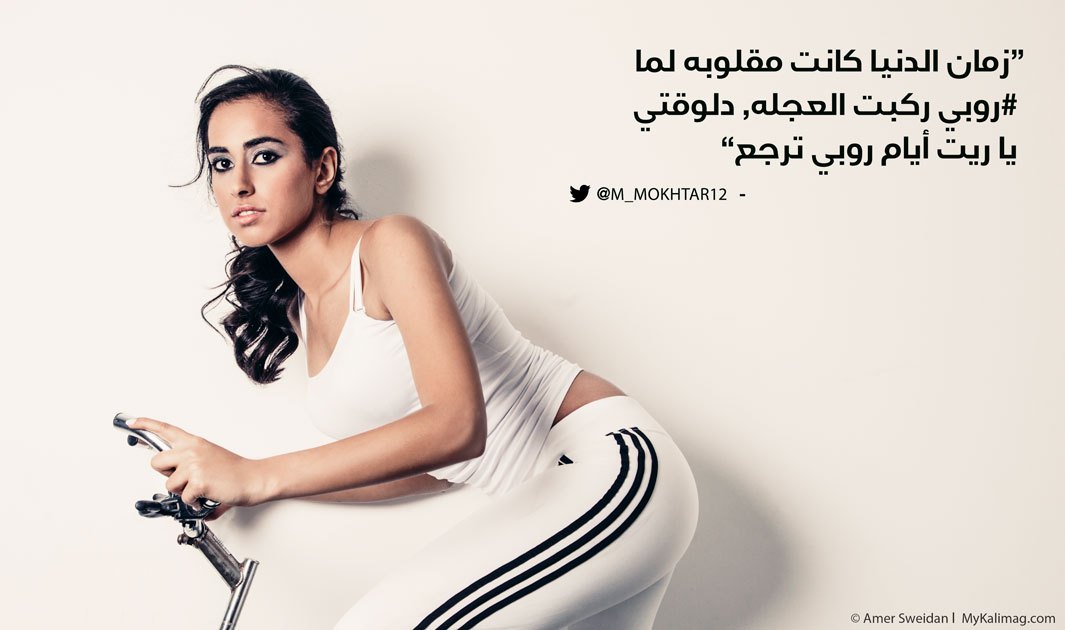
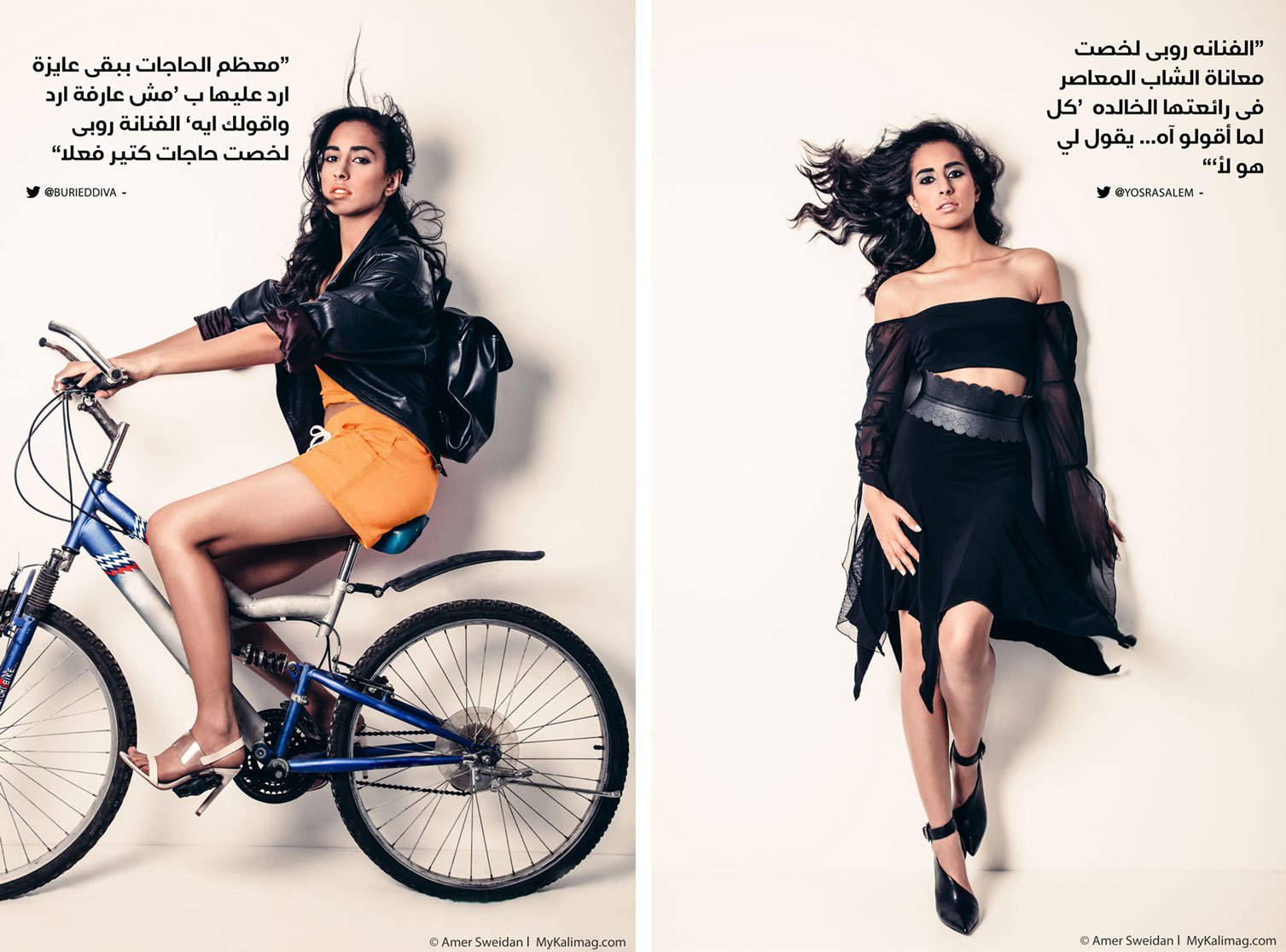
Top image: H&M. White sports pants, Adidas. Look inspiration: Ruby’s ‘Leih Beydary Keda‘. Images below, Left: orange tanktop and short-shorts, both sportswear from H&M. See-through and beige sandals, BCBG Max Azria. Leather jacket and bag, secondhand vintage. Look inspiration: Ruby’s ‘Ana Omry Mastaneit Had‘. Right, long sleeved chiffon croptop and skirt, were created specifically for this shoot by the stylist/designer, Fadi zumot. Leather shoes and belt, BCBG Max Azria.) Look inspiration: Ruby’s ‘Kol Ma A’olloh Ah‘
Lougien – Jordan/Canada
“I remember the undeniable negative response from the general public that stirred a mild obsession, a guilty pleasure of some sort. Personally, I watched the video repetitively (whenever it aired) despite my parents’ grunts, and was confused with my feelings of empowerment. The video was the first of its kind that I’d seen in my humble life at the time. Overall, watching Ruby on that bike played a part in moulding my identity as a woman and harnessed my innate power of sex appeal. I still like to listen to that song before getting ready for a night out, it’s a confidence booster!”
Ayman – Jordan
“It was like a fresh breathe of air in the Arab World. She was truly bold and didn’t stick to the stereotypical models of art at that time. I’m sure her and a few other artists’ presence has changed me, made me less intimidated and more daring to be different in closed-minded societies. As for my behavior, I remember I started to adopt some of her moves in school and find joy imitating her, and that’s my memories from my school days.”
Rami – Palestine
“Ruby gave me the reason I was looking for to dance in front of my mirror. #eb2a_abelni”
Ahmad – Jordan
“I will never forget the first time Melody TV played ‘Kolamma Ollo Ah’ eleven years ago. I’ll never forget the shock on my family’s face. ‘When did we get this low?’ ‘What is she thinking?’ were a few of the comments they said the moment she swept down the pole. On the other hand something moved inside of me, something that I didn’t understand at the time. It just felt good, like a phoenix rising from the ashes, I felt free, liberated and unleashed. That very moment might’ve been rated-R for Arabian pop culture. It made a huge difference in our gay community, the expressions, sensation, sexuality and liberation that this song delivered to every closeted repressed gay man in the Middle East, expressing our emotions through its melody and music video. Our community needed such an artist to reflect our inner selves, though no one will know about our feelings towards her, and I don’t blame them. Maybe heterosexuals look at Ruby as a sexual icon, but they can never understand her impact on us. Ruby would’ve been overlooked by all the critics if she was blonde, it’d totally make sense to some closed-minded Arabs due to their typical stereotyping, but her shockingly Arabian beauty gave them second thoughts. I wish someday Ruby will suddenly release an album, or even a single, her existence in our sub culture is necessary and unique, we need Ruby’s music and flavor. Ruby… we miss you.”
Raji – Syria
“Now the question is: Why Ruby in particular? Many other artists came to the scene and offered seduction as well! I’ll tell you why. Ruby appeared in simple fashion styles and offered a spirited performance that entered our hearts quickly, but Arab society is filled with contradictions; what enters its heart is one thing, and what comes out of its mouth is something else. For me, Ruby became like Sabah, Fairuz and Umm Kulthum… They all left a mark on art.”
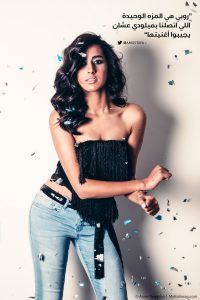
Top, and belt, stylist’s own; were created and layered by the stylist. Jeans, H&M. Look inspiration: Ruby’s ‘Ghawy‘.
.
Nizar – Jordan
“Ruby is a rare Arab icon. I’m one of her biggest fans; I literally know all her life details since she first came onto the scene. If she’d continued doing what she was doing, many of today’s female artists would have ended up washing dishes. She simply changed the perception about modern Arabic music. I remember her being the first Arab artist to cause controversy in everything she did. When she entered Kuwait, banning her concert was discussed in parliament. She never cared about rumors or criticism as she was stronger than that, regardless of her being one of the most common topics to be debated in Arab media, occupying the minds of journalists, writers and magazines.”
Dorra – Tunis
“It was 2004, I was living in a boarding school in the south of Tunis, which was the most conservative part of Tunis at the time. When Ruby’s song ‘Leh Bedari Kedah’ came out, it was the only topic the girls would discussed during lunch breaks, trying to track the video clip on Arabic music channels. They were amazed at how daring Ruby’s moves were while she ‘biked’. I also recall that time when I had the basic Nokia phone, the one where you can type the note of any song and set it as your ringtone. We were smuggling the Ruby ringtone and letting it ring several times in a row, trying to sing the lyrics along with it and laughing in between as we tried to imitate Ruby’s moves. One time, I was watching TV with my dad and it happened that her video clip was on. My dad gave me a minute to change the channel. Back then I was surprised by his reaction, as we were used to watching French movies together with kissing scenes, and I wondered why Ruby was beyond his limit of acceptance? Maybe he thinks that kissing scenes in movies are within the context of the scenario. But what does he find tolerable in those movies that he could not correlate in Ruby‘s video clips? Maybe her tongue-in-cheek Arabic sass, or maybe the tan, woke something in him; the jealousy of a dad that didn’t wish to see his daughter acting in such a way. But would my dad dare watch Ruby’s videos if I was not in the room? Well, I think I have to ask him that, even though I am pretty sure he would!”
Mukhtar – Jordan
“‘Leh Bdedary Keda’ is the only song I saw by Ruby. Around then, I’d stopped listening to music altogether and entered a religious phase. At that time the quality of the video clips and songs began going downhill, becoming weak in substance, story and acting, and focusing more on dancing. The 90s’ music was better.”
Hasan – Jordan
“When I first saw Ruby in ‘Inta Aref Leh’, I thought of how cool belly dancing could be when mixed with modern pop music, and how strangely beautiful this girl was! Mostly, though, I thought that I needed to advise her to do her eyebrows! Then she came up with ‘Leh Dedari Keda’ and I was like This girl is going places! She would be the future of Arabic music. She became my favorite Egyptian diva.”
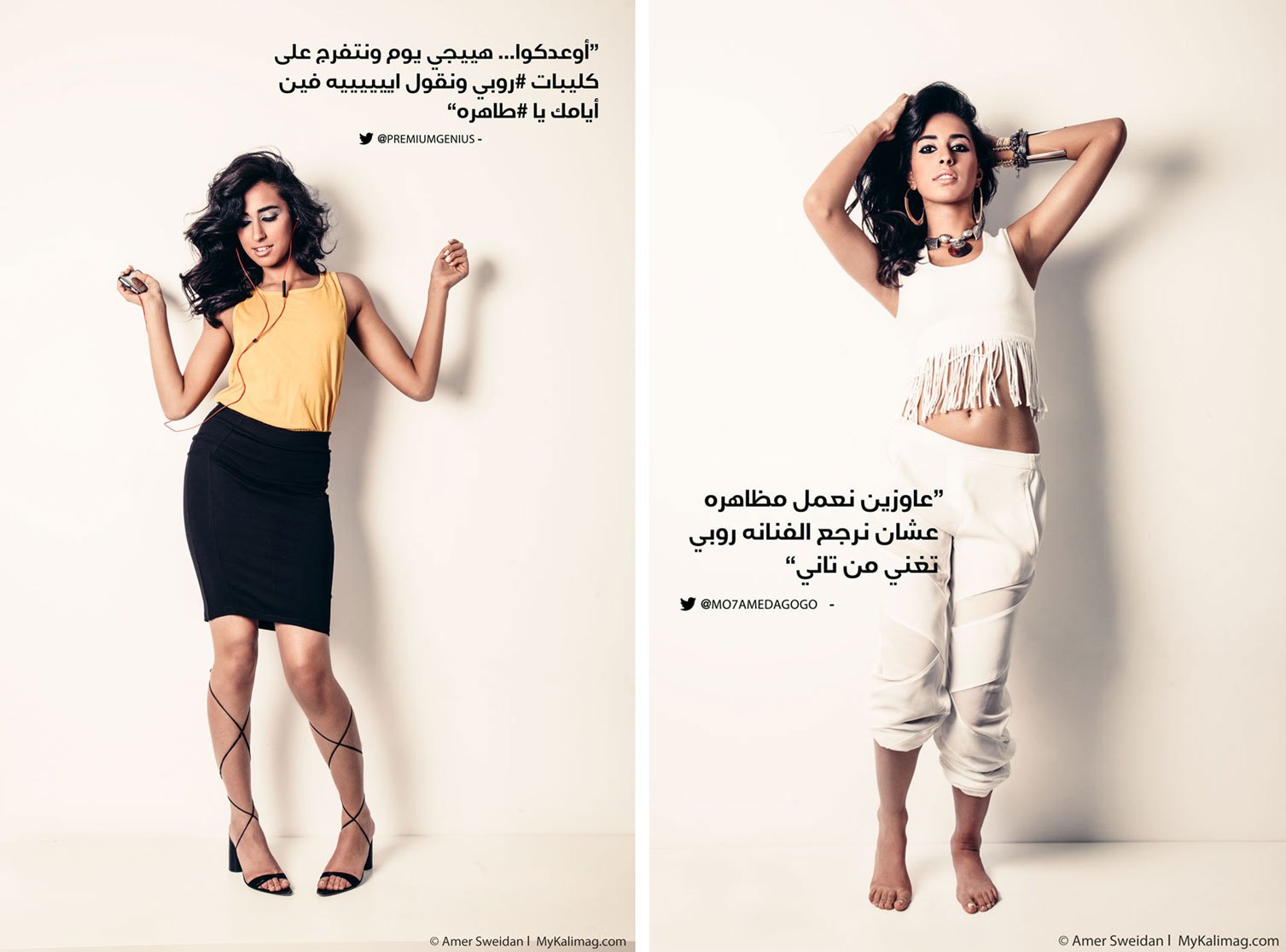
Left, top, Fruit Of The Loom. Skirt, Marks & Spencer. Strappy sandals, Trans-parents Italy. Look inspiration: Ruby’s ‘Enta Aref Leih‘. Right: Fringe top, and pants, BCBG Max Azria. Earrings, necklace and bracelet, H&M. Look inspiration: Ruby’s ‘Yal-Romoush‘
Sami – Jordan
“I come from a religious family, and watching the bold music of 2000s was something that I did secretly. When Ruby first came out, I immediately felt some kind of connection with her, a beautiful bold Arab woman who knows how to dance and sing. We used to hear her music everywhere, in the streets, malls and passing cars. She was a phenomenon. I remember dancing to ‘Leh Bedary Kedah’ and listening to it whenever and wherever with my friends and cousins and imitating her cute moves, which we were too young to consider sexual. We just did it for fun, she was something new and different, and although many didn’t accept her as an artist, no one denied the fact that she is a phenomenon, and you can’t hear a Ruby song without admitting the fact that her songs are catchy smash hits. Once her movie came out, I bought the DVD. All of my cousins and young siblings gathered and we locked the door so that we could watch it secretly, but my dad found out and broke the CD into pieces. Even he knew about Ruby. He didn’t accept her at all, but later on once we grew up and listened to Ruby, dad stopped commenting on her songs. We still dance to her songs, nothing moves our feet like Ruby’s music. I wish she knew how much of a beautiful thing she is to us, she’s part of our early teen years. Our happiest moments were lived while listening to her music.”
Marwa – Serbia
“I remember the first digital receiver I purchased, it was the first time that a satellite had entered our home. I used to wait for Ruby’s music, along with that of Nancy Ajram and Myriam Fares, to come on. When I remember Ruby I’m reminded of when I was 15; it was a volatile and strange period in my life as I was still discovering my homosexuality. That period left me with many colorful memories and happy days.”
Iman – Tunis
“She didn’t have a big impact on Tunisia’s pop culture. I think the impact was more tangible in Egypt as it had a more conservative society. I remember her first song was controversial because she mixed belly dancing with singing and came up with something totally new but also sexy! I remember also that video clip was filmed in the street (though in Europe was still somehow rebellious at that time), claiming freedom of action, movement, sexuality… etc.”
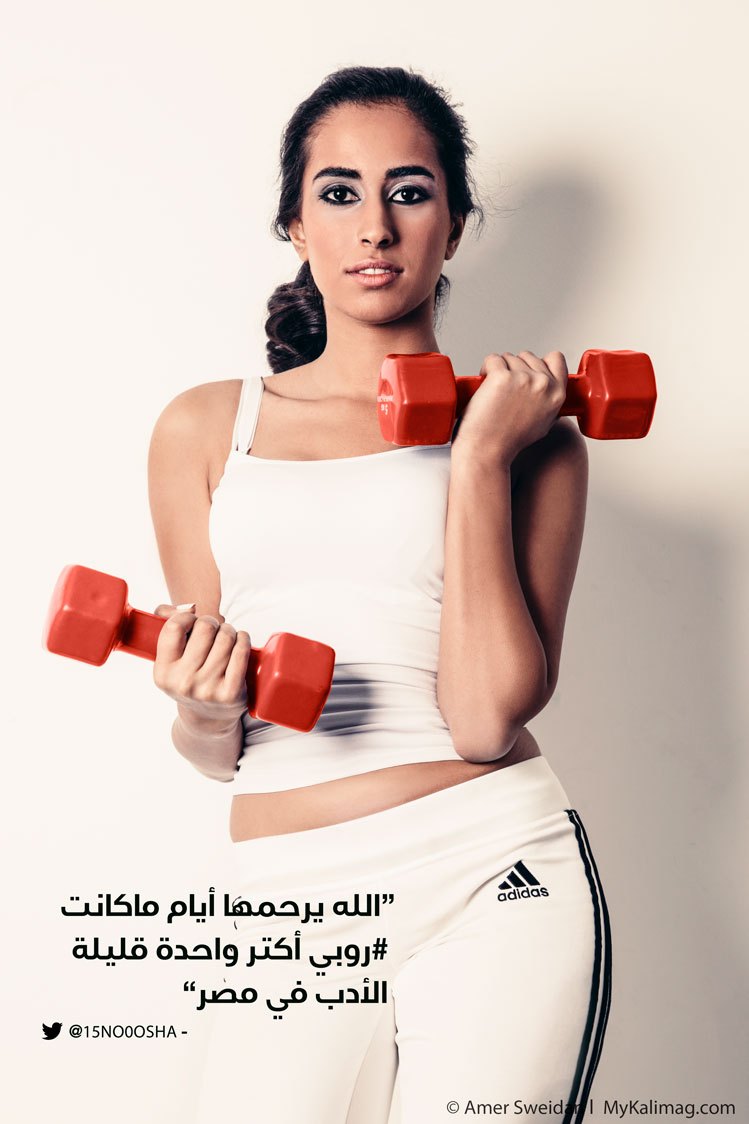
Featured image, and image here: Top, H&M. White sports pants, Adidas. Look inspiration: Ruby’s ‘Leih Beydary Keda‘.
Elias – Lebanon
“As a 13-year-old, I watched Ruby emerge as a beautiful young artist who portrayed herself as an Egyptian icon, unhindered by the outdated values that had been controlling women’s sexuality for decades. Ruby’s appearance in the limelight provoked many sexist jokes concerning her style of clothing and seductive choreography. Personally, I never related to or was swayed by this mockery, especially given that we do not necessarily hear similar comments when watching music videos by Beyoncé, Britney, Christina and others. It is as if the Arab female and the Western female come from two different species. Ruby’s presence was a small reminder of how Egyptian and Arab female artists were able to express themselves freely and more openly, in a stylish and daring way, since the 1950s. Ruby’s controversial yet normalized presence gave us a break from the culture that was imposed on us, and allowed us to taste the culture that we thirsted to revive, the 1001 Arabian Nights’ passion, lustiness and rebelliousness.”
Sami – Algeria
“I liked Ruby a lot, especially how bold she was, walking freely in her oriental belly dancing outfit. I was awed by the liberalism in the West. Everybody looked at her admiringly and she remained unharmed. If she had stepped out in that dress here, there would have been hell to pay!”
Dunia – Iraq
“‘Shame on you, daughter, what is this?’ And so began my awkward and unhealthy relationship with sex. For years my erotic fantasies revolved around what can only be described as Hitler’s ideal of the perfect man. The thought of a hairy, dark Arab guy was so taboo in my mind because I was marinated for years in the Arabs’ hostile view of sexuality. Not helped by the fact that the Arab sex symbol was Haifa Wahbe, a light-skinned, blue-eyed beauty, fixed up to look like an English-Italian hybrid.
Well, I guess that’s what sexy Arabs look like! Enter Ruby. Everything an Arabic woman should be: caramel skin, thick and curly raven hair, big black eyes framed by more than enough eye liner and of course, a freaking fabulous body, full breasts, big hips and slender hands all presented to me on a plate of belly dancing with a side of sultry voice. I fell in love!
So the song I’m talking about is ‘Yal Romoush’, a soft and heartfelt Egyptian tune set in an old Moroccan town with Ruby dressed in Arabic fabrics, beads and silver all swaying with her as she danced in the sunset calling out to me, ‘Look, this is you, this is me, this is all of us. Look how beautiful and sensual we are, let it out, all of it, be free you are an Arabic woman, be proud of it.’ And I obeyed. I guess in a way, Ruby is the equivalent of the sex talk our Arabic parents refuse to have with us.”
س.
Follow My.Kali on Instagram

